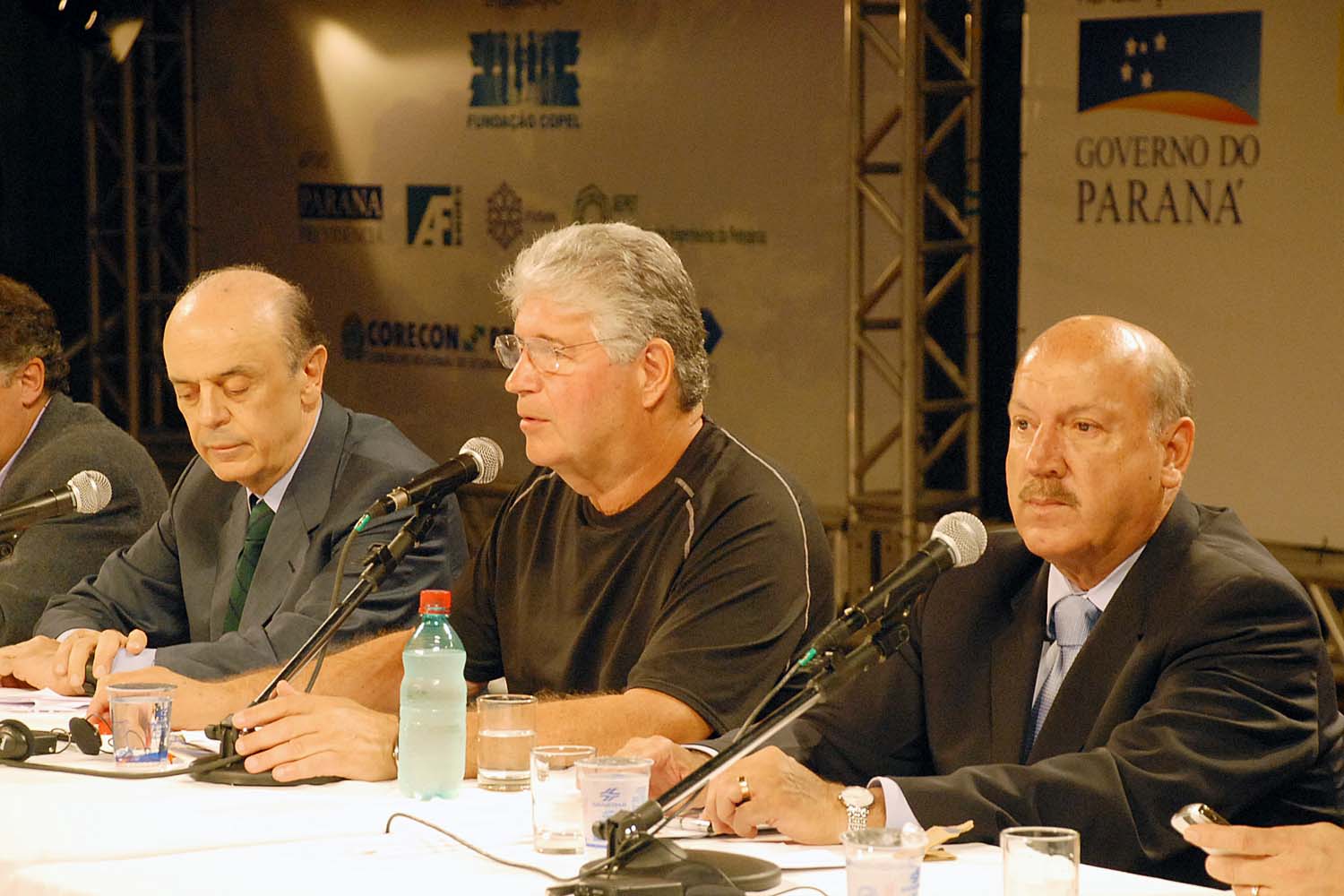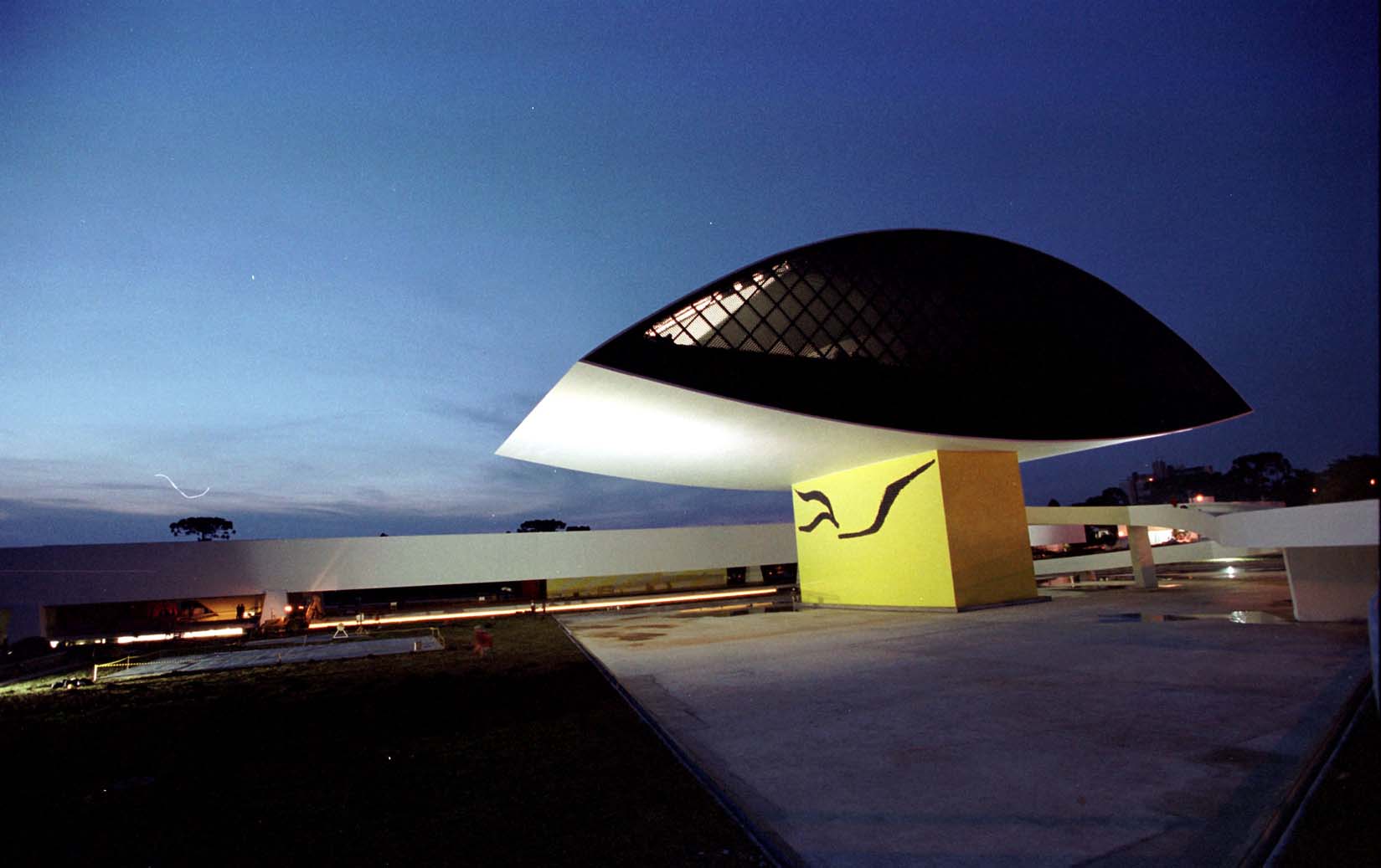The International Crisis WS almost Final Report
Emilio de Lima (Ed.) | 15.12.2008 18:12 | Globalisation | Birmingham | World

Serra, Requião e Luiz Henrique

Lessa

Oscar Niemeyer's Museum
Brazil must be more agile in the short term to address the crisis in the world economy. Including the maintenance of the investments of states and Union, the fall in the rate of interest and review of exchange policy. The statements were made by the governor of Sao Paulo, Jose Serra, at the close of the seminar "Crisis: Directions and Truths", organized by the government of Parana, where met for five days, 1.5 thousand people among economists, sociologists and academics .
The Governor of Santa Catarina, Luiz Henrique da Silveira, suggested during the closure of the seminar Crisis - Directions and Truths in Curitiba, a reduction of 30% of the value that is charged by the Union of States in debts. This, he says, is one of the biggest barriers that Brazil has for the full development and the measure would help combat the effects of the crisis in the global financial system.
He pointed out that Brazilian states pay 13% of its net revenue in a real consolidated debt with the Union "The proposal I made to the Minister of Finance, Guido Mantega, and I will make to President Lula is that states retain 30% of the payment of debt and transforme it into investments in infrastructure, in a combined program with the federal government, "he said.
The seminar Crisis - Directions and Truths was closed this Thursday (11th) with the formulation of proposals that go beyond the simple diagnosis. The seminar brought together more than 35 specialists among economists, sociologists and journalists from Brazil and countries such as China, Argentina, Mexico, Italy, United States, Russia, Ecuador, England and Venezuela, that for five days showed paths and, above all, demonstrated the need for discuss the current economic crisis to overcome it.
The solemnity of closure had the presence of governors of Parana, Roberto Requião, of Sao Paulo, Jose Serra, of Santa Catarina, Luiz Henrique da Silveira, and Senator Alvaro Dias, in addition to the speakers as teachers and economists as Carlos Lessa and Darc Costa. They highlighted the initiative and praised the governor Requiao out in front with a discussion of the crisis, which is reaching serious proportions and threatening the economies around the world.
Lessa warned against the harmful effects that can shoot down on the economy cause of the growth of household borrowing at Brazil, which has been going on since 2006. The families were induced to credit, via credit enshrined at a discount to retirees or in pay-checks, which made the retirees and employees the ideal debtors without risks for banks. For the families, the availability of credit was an opportunity to increase the properties and goods, as otherwise would not have how to buy the durable goods that they dream and need.
The economist estimates that the total value of loans today is equivalent to 40% of Brazilian Gross Domestic Product (GDP). The loans were provided from the purchase of cars to financing of plastic surgery, which was a brutality in the evaluation of Lessa. According to him, as everything that Brazilians and their families earn correspond to 37% of GDP, "so the debt is one quarter of total wages paid in the country," calculated.
The governor Roberto Requiao said this Thursday (11th), at the close of the international seminar "Crisis - Directions and Truths" in Curitiba, that will be prepared by the Government of Parana a document combining the ideas and proposals from Brazilian and foreign speakers during the five days of the event. In addition, CDs will be recorded and sent to state governments, schools of economics, regional councils of economy and libraries.
"The idea was that with the multiplicity of perspectives, with the observation of other countries, we could articulate a battery of suggestions for the problem faced in Brazil," said Requiao. According to the governor, the document "will be written with more time because the ideas of some 30 speakers, Germans, Italians, Russians, Americans, Argentines, Mexicans, Brazilians and Ecuadorians can not be summarized in just an end of afternoon."
Requiao also stressed that the workshop was funded by federal agencies, such as Banco do Brasil and Caixa Economica Federal, and by companies of the state of Parana. "This has supported the process of discussion and will support the edition of the CDs," he said.
"At the opening of the seminar, I've suggested that he was not gatopardiano, lampeduzziano, which did not propose anything to keep everything as it is. The issues should be deepened. I've devoted the seminar to Brazil, Lula and the authorities of the Republic", stressed Requiao.
The closure was attended by Governor of Santa Catarina, Luiz Henrique da Silveira, and of Sao Paulo, Jose Serra. The foreign experts who participated in the seminar were Yury Gromyko (Russia), Mario di Constanza (Mexico), Tom Palley (USA), Mario LETTIERI (Italy), Paolo Raimondi (Italy), Magnus Ryner (U.K.), Lorenzo Carrasco (Mexico), Alex Izurieta (UN), Andrei Kobyakov (Russia), Aldo Ferrer (Argentina), Jose Felix Rivas (Venezuela), March Naranjo Chiriboga (Ecuador).
The Brazilian panelists were Aloizio Mercadante, Maurílio Schimitt Leopoldo, Jose Carlos de Assis, Francisco de Assis Innocent, Marcio Henrique M. de Castro, Franklin Serrano, Carlos Medeiros, Ênio Verri, Wilson Cano, Marcio Pochman, Reinaldo Goncalves, John Sicsú, Carlos Lessa, Darc Costa, Ricardo Carneiro, Cesar Benjamin, Eugenio Staub, among other experts and authorities.
The political scientist Benjamin Caesar emphasized the space to discuss different economic strategies as the main focus of the international seminar Crisis-Directions and Truths. "We've fight here against an idea that has been hammered for many years into the head of people, that there are no alternatives, this view that only an economic policy is possible and all others are dreaming or utopian," he said during the debate among participants that Thursday (11th) morning.
Benjamin warned that the economic policies of Brazilian government, used at the time of rise of international finance, will not work at this time of crisis. "We can not get that erratic reaction, to try to manage the crisis, making minor adjustments. Macroeconomics on short-term contains the hegemony of neo-liberal vision, because only responds to the demands of foreign capital, which is fluid, mobile and contrary to the idea of nation , "He said.
"The development policy should be long-term, this is the big question. But Brazilian state fell into a trap of interests of supranational nature - the holders of debts, which are defended in the Central Bank, and sub-national interests, as for example of agrobusiness, private schools, construction, major financiers of campaigns. No major economic policy has never been created. They only defend those interests, "he said.
TECHNOLOGY - The ways to develop technology in Brazil was also the subject of discussion among specialists. In view of Ricardo Carneiro, an economist at Unicamp, the project of economic development in Brazil is necessarily of two different plans, and that is one of them is independent of the dollar and the other should be internationalized.
"Few countries in the world can think of no system influence the dollar. But we have a great economy and territories, internal market and major institutions consolidated. In this sense, we can make an extensive and independent program of social and economic infrastructure ," he said. "However, we are a peripheral country with old technologies. The greatest innovation of the last 20 years happened in the sector of telecommunications equipment, where we do not have, for example, no field, no plant in semi-conductors. This development should be internationalized and we must have a strategy for it, "he said.
The economist Carlos Lessa, former president of BNDES, argued that other options are possible, such as the use of railways and waterways. "I want to relativize this issue. Brazil has a vast frontier for development that it has not yet incorporated: it is the matrix of transport. If we lessen our transport the freight will get cheaper, what represents an enormous gain in productivity for our competitiveness," he said.
Lessa cited examples of unique technologies developed in Brazil. "Petrobras is a leader in oil extraction in deep water. We also completely dominate the cycle of uranium, in which there are only three ways of doing and the country has the cheapest one. How wouldn't we not to learn to make chips or phone switches? " questioned.
BANK INTEREST - Lessa, answering a question from a viewer, called Brazilian bank interest tax as an "exploration of colossal proportions." "The difference between the rates charged and paid is abysmal. Special Checks charge 9% per month and an application made pays no more than 1%. The bank provides the credit line and know curves of the expenses of people but at the moment of distress presentes the most brutal blackmail charging fees, "he said.
Professor Carlos Lessa called the centralization of foreign exchange as support for the construction of a national project for Brazil overcome the crisis. In his assessment, to overcome the global economic and financial crisis depends on political will to make a great nation of Brazil in the period of ten years. Lessa participated in the final's panel of seminar Crisis-Directions and Truths, that Thursday (11th) explored the theme "Brazil: National Project and facing crisis."
For Lessa, a combination of public and private investments will enable the implementation of major programs of infrastructure. By describing this project, he supported the centralization of foreign exchange, with the Central Bank doing of the foreign exchange budget the key to national project in Brazil. To facilitate this measure, suggested the union of the Brazilian state banks such as Banco do Brasil, Caixa Economica Federal and Banco Nacional de Desenvolvimento Economico e Social (BNDES), in a single state bank, very strong.
As support for this project, Lessa highlighted three major enterprises that must be properly assessed. First, combine a number of public and private investments in infrastructure, energy, logistics and the pre-salt. Secondly, Lessa highlighted the need to change the matrix of transport. The predominance of road modal increases costs and makes the shock of productivity in the economy that Brazil needs, difficult.
Thirdly, Lessa called the modernization of Brazilian cities as a way to increase the productivity of Brazilian workers, whom currently spend about 25% of their time only in-home-work-home transportation. "We have to make a huge program of investment in transport on rails in big cities," suggested.
The Brazilian national project must be able to make the country "a center that is not an empire," a nation of "solidarity, brotherhood and fair," said Thursday (11th) the engineer Darc Costa, Doctor on Engineering from University of Rio de Janeiro (UFRJ) and former vice chairman of Banco Nacional de Desenvolvimento Economico e Social (BNDES). "What is our destiny in this crisis? This is what our project of nation must respond," defended.
I will escape from the situation and I'll hold the issue of a long-term gaze on the crisis, the national state and national project. The crisis is a break with the known, the imagined and the imposed. The crisis leads to change. It was in crisis after crisis that civilization has advanced. If you look at the past five centuries, we see three major crises - the crisis of separation between faith and science in the 16th century, the crisis of faith in centuries 17th and 18th, and the crisis of science, which happens at the centuries 19th and 20th.
The crisis of faith has led to an anthropocentric world, with the Renaissance, led to commercialism, the discoveries, the discovery of America and Brazil, the creation of the concept of nation, the national state. The crisis of faith in centuries 17th and 18th, brings a gradual death of God, an abandonment of religion, brings the genesis of the industrial revolution and the emergence of capitalism. Here is also the modern national state. Today, we live the crisis of science, with a loss of brotherhood, solidarity, and subordination to the total consumption, to the technique. Today, we are slaves of technology, we are slaves of consumption. We must replace the man at the center of the world.
The State: PACT BETWEEN MEN
The state is what separates us from wild hordes, is a silent pact among men. It occurs around common principles expressed in a constitution. The nation state arises when the king takes the monopoly of fiefdoms and of legitimate use of force, and also creates another concept, the currency. Where is the currency with the face of the king, there is also the state.
The modern national state arises from the crisis of absolutism. With the French Revolution, the king no longer has the power, now the citizenship does. Thus, each citizen has to do his own project in its own state project in order to legitimize the state. Woe is the genesis of the national project. Brazil has emerged in the first crisis, and became independent during the second crisis. What will be our destination in the third crisis? That is what our project of nation should respond.
TOLERANCE AS BASIS OF NATIONAL PROJECT
A national project should have two strands. The external aspect of the project explains how to insert in the world. The internal dimension must build our own world. What do we chase? All periphery wants to be centre. All barbarism wants to be educated. This is the path that leads all the rational existence. The project of the state, whatever, is to make the state center. Geographical, historical, economics and anthropology, we are part of Portuguese America, South America, away from major centers of commerce, we are almost a continent, with great resources, and we have a great asset, our people. We are a world in a new post. Brazil is holding a special people. We have characteristics that make us able to build the globalization until the end, which is the great dream of rational existence - a world that is one nation. We are Anthropophagic, syncretic, mestizos. And we are tolerant. It is this tolerance that should arise our national strategy.
Brazil has a national project, the internal dimension, after 1929. This project lasted 50 years, with Getúlio Vargas, without Vargas, and against Vargas, in the post-64. It was based on three pillars, industrialization, urbanization and national integration. Because Brazil is still a space to be conquered. Behind all, was the idea that the state must intervene each time you need to move forward - building what is important in industry, where private initiative does not, in urbanization, where private initiative does not, the integration National, where private initiative does not.
Now we have another dimension - the social action. To develop is not only filling cities, is to provide employment, health, housing, sanitation. A national project should observe the first three, and have a social component maximized. Our project should be focused on overcoming the challenges of crisis, creating a new world in the world where we are. There are two clear goals - we need to be center without being an empire, as the U.S.. We must be supportive, fraternal, fair. We must have new, in our view, the dream of being more than one state, but the state, the homeland of all men, and make the ideal of globalization, post in western philosophy. That is only possible if we place business and technologyl at service of man, breaking the slavery of the market and consumption. We must be free, but also to be freed.
The recession is a serious illness and when it is installed is more difficult to fight it. We have to preserve growth, "said professor Carneiro, who also earned a Ph.D. in Economic Science by Unicamp and post-doc by the Institute for Latin American Studies at the University of London." In the medium term, we need to finance the deficit of balance of payment Because this is a fact that is already going back to our reality. We must also return to the circuit of credit, as the government handed liquidity into the system, but the credit is frozen, "he noted.
For Carneiro, a second major challenge being faced is stop the speculation in the exchange industry. "This means not allow the market for derivative commands the formation of the exchange rate in Brazil. We must prohibit such speculative activity, because the market is a derivative of the neutron bomb that needs to be disabled. We need to have control of capital", examined. Today there are derivatives of assets as stocks, commodities (agricultural products, minerals etc.) Exchange, interest and more a series of instruments more "sophisticated" created by the market.
Emilio de Lima (Ed.)
 e-mail:
emiliodelima@gmail.com
e-mail:
emiliodelima@gmail.com
 Homepage:
http://www.aenoticias.pr.gov.br/tv-aovivo.php
Homepage:
http://www.aenoticias.pr.gov.br/tv-aovivo.php